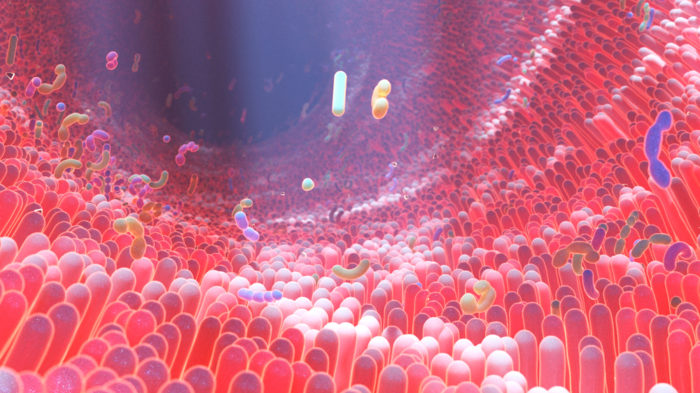
Gut microbiota are key controllers of healthy aging
June 21st, 2021Humans are living longer, according to the World Health Organization (WHO) the percentage of people over 60 will be duplicated on a worldwide scale by 2050. The number of elderly needing help by then will quadruplicate, this will put a much bigger strain on health providers and carers. To reduce the risk of overwhelming the health system, we need to prevent diseases associated with age such as diabetes and cardiovascular disease.
What, when and how much we eat affects ageing. Through diet and nutrition we can reduce the risk of disease and increase longevity by modulations of gut microbiota. In other words, having a healthy diet will make a substantial difference in how we age and how the world can cope with humans living longer.
The presence of microbiota in the human gut can have a large influence on ageing…
The human gastrointestinal tract contains complex microorganisms – the gut microbiota, this has a large influence on ageing and disease. Many areas of the human body have bacterial, viral and fungal inhabitants but the gut microbiome is the largest and most important. The primary function of the gut is the digestion and absorption of nutrients and the excretion of waste. Diet is one of the main factors in shaping our gut microbiota over our lifetime. It is important for maintaining our immune system and metabolic homeostasis and protecting against pathogens (a product that causes diseases). Changes in our gut bacterial composition (dysbiosis) have been associated with the cause of many inflammatory diseases and infections.
The gut and mental health…
The gut connects with the brain through hormones, chemicals and neurotransmitters that send messages. The messages that are sent can be affected by the bacteria, viruses and fungi that live in the gut. There is a strong relationship between having mental health problems and having gastrointestinal symptoms such as indigestion, heartburn, bloating, constipation or diarrhoea. Anxiety and depression can cause changes in the bacteria in the gut so mental wellbeing can affect ageing and disease.
What makes a healthy gut?
An adult has approximately 10 trillion bacteria in their gut, not all of the gut bacteria do you harm and some are beneficial. The evolution of your gut microbiota depends on your diet, environment and lifestyle. A fibre rich diet can help increase good bacteria in the gut, some types of fibre produce substances that are said to be protective such as short-chain fatty acids. Short-chain fatty acids are fatty acids with fewer than six carbon atoms. They come from intestinal microbial fermentation of indigestible foods, they are crucial to gastrointestinal health. An unbalanced diet and stress can make a difference to your gut health so it’s key to have a good diet and a healthy lifestyle.
Reep the benefits of a Mediterranean diet…
Research has shown that Mediterranean-style diets with plant-based foods, nuts and fish help friendly bacteria in the gut thrive. They help synthesize essential nutrients, produce fuel for cells in the colon and reduce inflammation. Insert link
https://ueg.eu/a/30 Studies by a team at the University Medical Center Groningen in the Netherlands assessed the eating habits and gut bacteria of more than 1,400 participants. The results proved that the Mediterranean-style diet was linked to healthier microbiota and associated with lower levels of inflammatory markers in stools. In comparison, a diet rich in meat, refined sugar and fast foods was linked to lower levels of friendly gut bacteria and higher levels of inflammatory markers.
The researchers concluded that having a healthy intestine with the right type of bacteria may be the key to tackling many chronic diseases.
Food recommendations to promote a healthy gut…
Yoghurt – live yoghurt is a good source of friendly bacteria (probiotics). Avoid high sugar content versions if possible.
Yoghurt drink – yoghurt drink is made from fermenting milk. Kefir is a yoghurt drink originating from Asia and Europe and is a great addition to smoothies.
Miso – Miso is made from fermented soya beans with barley or rice, it is full of goodness including helpful bacteria and enzymes. It can be used as a dip or marinade.
Sauerkraut – sauerkraut is finely chopped cabbage that has been fermented. It is full of probiotics, fibre and vitamins and ideal to serve with sausages.
Kimchi – Kimchi is a Korean dish consisting of fermented vegetables with the benefits of probiotics, bacteria, vitamins and fibre, an excellent side dish with meat and salad.
Sourdough – sourdough is a popular bread made with fermented dough, more digestible than regular bread and slow energy release.
Almonds – almond nuts are high in fibre and full of fatty acids with good probiotic properties and are great for a snack.
Olive oil – gut bacteria and microbes are found in olive oil and it helps to reduce gut inflammation. Olive oil is great to cook with or use as a dressing, it eases digestion.
Kombucha – Kombucha is a fermented tea drink full of probiotic good bacteria and is great as a refreshing drink or a base for cocktails.
Peas – the tiny green vegetables are full of soluble and insoluble fibre to help keep your digestive system in balance.
Brussels sprouts – the festive vegetables contain good bacteria with sulphur compounds which combat unhealthy bacteria such as H pylori.
Bananas – bananas are a healthy snack full of fibre and good bacteria, containing healthy minerals and a great component for a smoothie.
Roquefort cheese – the french smelly cheese that will give your gut bacteria a boost, it’s great with salads or spread on sourdough.
Garlic – garlic has antibacterial and antifungal properties, known to keep bad gut bacteria under control and balance yeast in the gut.
Ginger – fresh ginger can help the production of stomach acid which stimulates the digestive system to keep food moving through the gut.
Indians have a significantly higher abundance of good bacteria in the gut…
Studies found that Bacteroidetes and Prevotella are significantly dominant in Indians due to their high intake of milk products (including cheese or paneer, curd, buttermilk and other dairy products) and fermented products containing Lactobacillus.
Insert link https://www.ncbi.nlm.nih.gov/pmc/articles/PMC6015586/
Traditional Chinese medicines (TMC) are proven to help gut microbiota…
TMC has changed from an experience-based to an evidence-based medicinal system. Research about the link between TCM and gut microbiota have proven that it is a perfect agent to treat many kinds of diseases which are mediated by gut microbiomes.
Insert link https://www.ncbi.nlm.nih.gov/pmc/articles/PMC7188910/
As well as eating a healthy diet you can take supplements and we recommend:
Symprove® Original – this is a water-based multi-strain supplement containing 4 unique strains of live activated bacteria – L. rhamnosus, E. faecium, L. acidophilus, and L. plantarum. It is a probiotic that also comes in a mango and passion fruit flavour. Symprove is alive and active when it arrives from the bottle, it is water-based so won’t trigger digestion, hence survival in the stomach. The 4 unique strains of bacteria work together ensuring they thrive in the intestines.
Insert link: https://www.antiaging-systems.com/products/symprove-original/
Stomach Bioregulator (Nature’s Marvels™)– Normalizes the function of the stomach. Improves the performance of the stomach by normalising the digestive functions, helping to prevent gastric ulcers and polyps. It also helps to prevent heartburn, belching and the feeling of heaviness in the stomach.
Find out more about the Stomach Bioregulator here: https://www.antiaging-systems.com/products/stomach-bioregulator-natures-marvels/
Resources/ Further Reading:
2.) https://academic.oup.com/toxres/article-abstract/9/4/569/5896869?redirectedFrom=fulltext
3.) https://www.ncbi.nlm.nih.gov/pmc/articles/PMC5433529/
4.) https://www.ncbi.nlm.nih.gov/pmc/articles/PMC7460310/
5.) https://www.mhanational.org/fitness-4mind4body-gut-brain-connection








